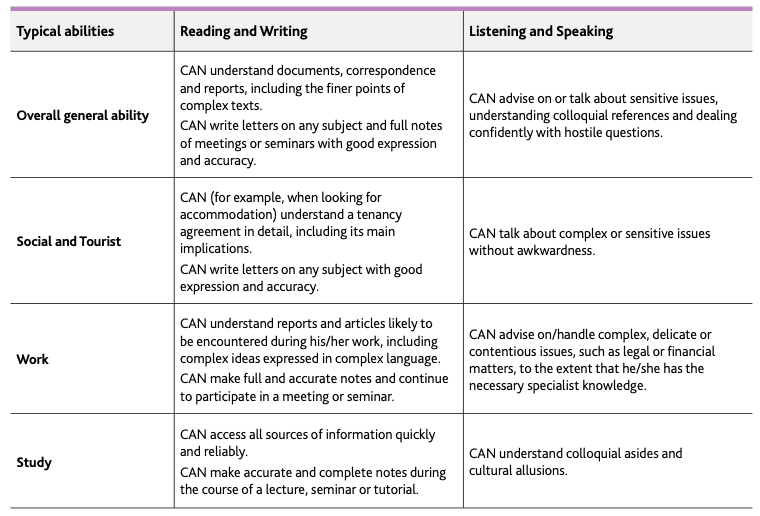How to achieve proficiency in spoken English
The main focus of this post is how to achieve proficiency in spoken English.
In July of this year, I was contacted by a lady who wanted to have classes with me. Having lived in the UK for 15 years, and possessing a degree in languages, it quickly became apparent that Ms Beata Patok has mastered English to an exceptional level. You can read my discussion with Beata below.
Anyway, I must have taught English to several thousand students since 2006. Frankly, there are only two other students, in addition to Beata, who stand out in my mind as being ‘proficient’ in the language. I wrote about one of them, Maja, in a post I wrote back in January 2020. The other student was a Russian lady I taught some years ago.
In the first section of this post, I briefly outline what achieving spoken proficiency in English entails. Let’s dive in.
Section 1 - The ins and outs of proficiency in spoken English
A C2 level of English is a native level
Several frameworks exist which describe language proficiency. For the purpose of defining proficiency in spoken English, I shall refer to the Common European Framework of Reference for Languages (CEFR).
Basically, the CEFR sets out six levels of foreign language mastery:
A1 - Beginner
A2 - Elementary
B1 - Intermediate
B2 - Upper Intermediate
C1 - Advanced
C2 - Proficient
In a nutshell, a C2 level of English is a native level. A C2 level according to the CEFR doesn’t solely refer to speaking skills. Those at this level can also read on any subject and write creatively. Someone at the C2 level can also understand virtually everything they listen to with ease.
What is proficiency in spoken English in reality?
To define proficiency in spoken English, it’s worth presenting the following point which I found on efset.org:
Can express him/herself spontaneously, very fluently and precisely, differentiating finer shades of meaning even in the most complex situations
Clearly, fluency and precision should be in harmony with each other when it comes to spoken proficiency.
According to efset.org, a student at the C2 level should be able to:
- talk about stress in their life and the lives of friends and colleagues;
- discuss financial planning and give and comprehend advice when it comes to personal finance;
- talk about celebrities, celebrity activism and gossip about celebrities;
- discuss topics pertaining to science and technology. For example, new inventions and robots.
Moving on, a C2 Proficiency Handbook for Teachers compiled by Cambridge Assessment English provided the following table with regard to what candidates should be able to do at Level C2:

In sum, guidelines from both efset and Cambridge Assessment English point towards a proficient speaker’s ability to talk about complex, contentious and sensitive issues.
Section 2 - A discussion with Beata Patok
Here's a transcription of a discussion I had with a proficiency student of mine, Ms Beata Patok:
1. Would you say you benefitted from complete English language immersion in the UK, and was it this which led to proficiency in English in your case?
Indeed, immersion is key, as you said. I benefited from a combination of being surrounded almost exclusively by English - listening to the language every day in different contexts - and also having to produce the language. Still, I feel that it isn’t necessary to use the target language on a daily basis. It’s the receptive input - listening and reading - that counts.
Steve:
An intriguing point there regarding receptive input.
Can proficiency in spoken English stem from a conscious connection with the way the learner internalises receptive input? Namely, the conversations going on around the learner.
Between 2014-18, I was completely immersed in the Serbian language when I lived in Serbia. Frankly, I’ve never been much of a talker. However, I believe that I’m able to produce fluent and accurate streams of speech in Serbian.
The burning question is - would I have attained a proficient level of Serbian had I ONLY been exposed to my spouse’s input in Serbian if we had lived in England, for example? Would the lack of input I was surrounded by in the street and in local government institutions have held me back?
It’s hard to say. A question for the professionals I suppose.
2. Did you adopt any specific language learning strategies to help you reach proficiency in English?
I tend to write down phrases. When I hear something, I pay a lot of attention to the context. I need to be 100% sure that I can use a particular phrase or word in a certain context. When conversations were going on in the office back in the UK, I used to listen to my colleagues for the wrong reasons. There were times when I wasn’t paying attention to the content as I should because I was purely concentrating on the language. However, I benefited enormously from that. So, from these conversations, I’d write down phrases, as well as the whole sentences they appeared in, to aid my understanding. Therefore, I engaged myself in learning by heart and relying on context to catch the full meaning of a phrase. The next step was to use these phrases at the first given opportunity so I wouldn’t forget them. I would think to myself - how could I apply that word or phrase in what I do at work or daily life in general? Fortunately, I had two or three individuals around me at work who I considered to be proficient speakers. I paid a great deal of attention to the things they said and how they applied language. Essentially, they were role models who I followed without them even knowing. I did that for years. What else? Subtitles for movies. You can see a word and simultaneously hear how actors pronounce it. That worked for me.
Steve: So you didn’t read through these phrases you wrote down. It was all about listening and exposure?
I was too lazy to read through them. That’s the beauty of living in a foreign country for 15 years. If you hear phrases over and over again, acquisition must follow. It was just a matter of constant exposure for me. Personal interest also helps. I love English. I just want to remember each and every phrase - just for me - to sound better and to express myself accurately.
3. In your experience as an English language teacher, what barriers do Polish learners of English face when it comes to reaching a C2 level in English?
Students at all levels in this country fear speaking in general. I’ve noticed that even advanced level speakers carefully weigh their choice of words before they say something. It seems to me that the more proficient a student is, the more afraid they are of making a mistake. They have this mindset that they shouldn’t be allowed to mistake at advanced or proficiency level. Of course, even a proficient speaker will never be 100% accurate. Personally, I put a great deal of energy into letting my students know that it’s ok to make a mistake. First of all, I strive to get my students to relax and produce language. The accuracy will come later.
Steve: I’ve written a great deal about negative language transfer and how students can overcome it. How do you think Polish learners of English get away from directly translating everything from Polish into English when speaking?
Again, I think it comes down to immersion and listening. Students can absorb so much through listening - such as intonation, syntax, rhythm, stress patterns and lexis. I always encourage my students to move away from Polish and paraphrase using English words when they get stuck.
* I touched upon the topic of negative language transfer and fossilisation quite heavily in this post:
Section 3 - How to achieve proficiency in spoken English
When it comes to attaining proficiency in spoken English, of course it helps to watch movies, read books and take classes with native speakers or those proficient in the language.
However, you need to adopt a language learning strategy to supplement your learning of English. Certainly, it might take some trial and error to settle on a strategy which works for you.
Idea 1 - The Word-Phrase Table
Frankly, I’d never have picked up Serbian to advanced level in such a short space of time had I not persevered with my Word-Phrase Table.
Essentially, when I encountered a new word or phrase that I considered to be worth learning, I added it into my Word-Phrase Table on a Google Doc. Then I added other word forms, collocations and personalised sentences to cement the learning of a particular word or phrase. Take a look at this example:

The example sentence (after *) translates as “In my opinion, persistence is the essence of business”.
So why include your own opinions, true sentences about your own life situation or any other situations you’re familiar with?
Well, I believe that with regular revision, these short sentences ‘swim’ around the brain, waiting to be retrieved in future conversations. Hence, these sentences can aid both fluency (immediate retrieval) and proficiency (the sentences must be accurate, assuming they’ve been checked by a proficient speaker).
I also believe that colour, italics and different fonts can enhance the memorisation process.
Idea 2 - Voice recording
Voice recording can be a highly productive method to help you reflect on your speaking and improve accuracy.
A few years ago, I encouraged some of my lower level students who used English at work to create voice recordings of a sample of their speech.
Check out the transcript below from a voice recording which one of my students made. It was his first attempt at voice recording:

In order to ease my students into the process of voice recording, I transcribed the first couple of recordings to home in on their most glaring errors.
It’s vital that you develop a ‘critical ear’ so that you pick out your main areas of weakness.
In the case of the recording above, this student had issues with articles (a/the) and using do/does in negative statements when they should be used in questions. He also applied uptalk at the end of every clause. Uptalk, also known as high rising intonation (HRI), is when someone ends a declarative sentence with a rising pitch similar to that typically found in yes-or-no questions.
As a result of the feedback I offered to this student, he was able to cut out uptalk in his subsequent voice recordings and even during our classes.
It may be trickier to eliminate heavily fossilised grammar errors than dealing with phonological aspects. However, persistence is required to reap the benefits of voice recording.
Summing up
You should now be aware of what spoken proficiency in English genuinely entails and how you can reach this level.
Even if you’re not in the position to live in America or the UK, even for a temporary period, all is not lost. It’s vital that you immerse yourself in English and adopt one or two language learning strategies which you feel comfortable with.
Final Recommendations
If you want to find out more about the Cambridge proficiency speaking exam, check out this post:



